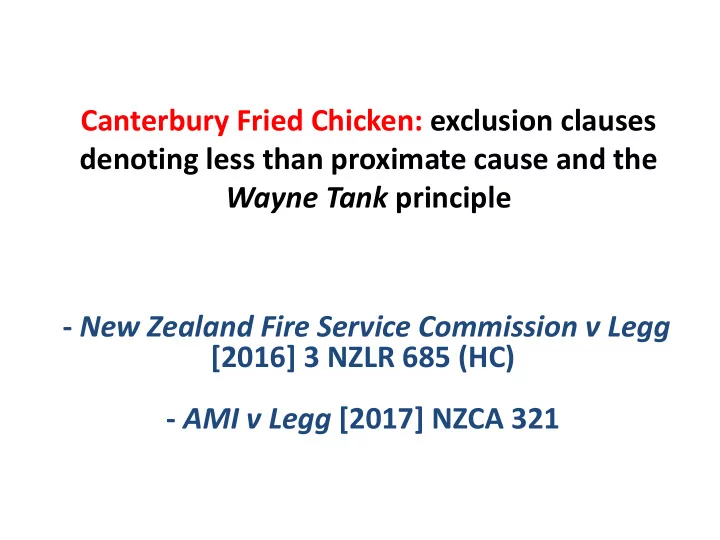

Canterbury Fried Chicken: exclusion clauses denoting less than proximate cause and the Wayne Tank principle - New Zealand Fire Service Commission v Legg [2016] 3 NZLR 685 (HC) - AMI v Legg [2017] NZCA 321
The facts • The Leggs own a lifestyle block in Selwyn District, rural Canterbury. • On about 16 December 2012, they light a burn heap on the property. The heap is a mixture of green waste from the lifestyle block itself and the Leggs ’ landscaping business (“ELL”). • The heap burns out after about a day – or at least appears to. • On 10 January 2013, a nor’wester arrives. The burn heap reignites. A large fire ensues causing widespread damage, including the destruction of a poultry farm where 18,000 chickens perish. • The New Zealand Fire Service Commission pursues the Leggs and ELL for the cost of putting the fire out. Both admit responsibility. • Both the Leggs and ELL are insured for legal liability. The insurers, AMI and Lumley, decline indemnity.
The policy The AMI insuring clause: “We will cover, unless excluded by this policy, your legal liability, arising from or in connection with your farming operation, for accidental damage to other people’s property occurring anywhere in New Zealand.” The AMI exclusion clause: “There is no cover for legal liability arising out of or in connection with any retail shop, (except a shop on your farm property selling your farm produce), café, restaurant, tourist operation or any profession, business or trade not directly connected with your farming operation.” (emphasis added)
AMI’s arguments • The exclusion clause applies: the Leggs are not entitled to indemnity. • Waste from ELL’s business was the main reason for lighting the burn heap, so an excluded cause was the proximate cause of the loss. • T he words ‘in connection with’ in the exclusion denote something less than a proximate cause of the loss. • It does not matter that something which is covered by the policy (waste in the burn heap from the Leggs ’ farming operation) was a concurrent cause of the fire: the Wayne Tank principle applies.
Nation J’s decision • The exclusion clause requires AMI to prove that the presence of waste in the burn heap from ELL was an “effective” cause of the 10 January fire. • On the evidence, AMI cannot show that waste in the burn heap from ELL caused the 10 January fire. • The Wayne Tank principle only applies where there is an excluded “concurrent cause of the insured’s loss” and ought not be extended beyond such cases. • Accordingly, the exclusion does not apply and the Wayne Tank principle does not save the situation for AMI. • Section 11 of the Insurance Law Reform Act 1977 does not assist the Leggs.
AMI v Legg (July 2017) The Court of Appeal (per Miller J): • Nation J is correct in his interpretation of the words ‘in connection with’ - they require a causal connection, albeit less than a proximate causal connection. • On the evidence, there was a sufficient causal connection. • The Wayne Tank principle applies. • No mention of Nation J’s conclusion about s 11 ILRA.
Points to note: • The words ‘in connection with’. • The Wayne Tank principle. • The Court of Appeal’s view of the facts as they related to the issue of causation.
Recommend
More recommend